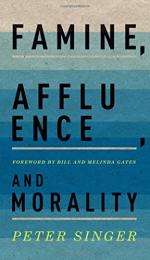|
This section contains 1,113 words (approx. 3 pages at 400 words per page) |

|
Utilitarianism
Peter Singer is known for being a utilitarian ethicist in the field of moral philosophy. Generally, utilitarianism refers to any ethical theory that favors actions that produce the best outcome, or the highest amount of “utility,” which usually refers to well-being, or happiness. In a wide-ranging sense, utilitarianism mostly focuses on the consequences of an action, rather than the intentions behind those actions. Additionally, utilitarianism considers the outcomes which will have the best effect on the whole, or the most amount of people, rather than exhibiting favoritism toward a select few.
In the essay, Singer does not indicate that he identifies specifically with utilitarian philosophy; however, his argument is very utilitarian in nature. As a whole, his argument pushes for a way of life that reduces suffering, thereby maximizing well-being across the world. Additionally, since he says we have a responsibility towards people in our own society just...
|
This section contains 1,113 words (approx. 3 pages at 400 words per page) |

|




